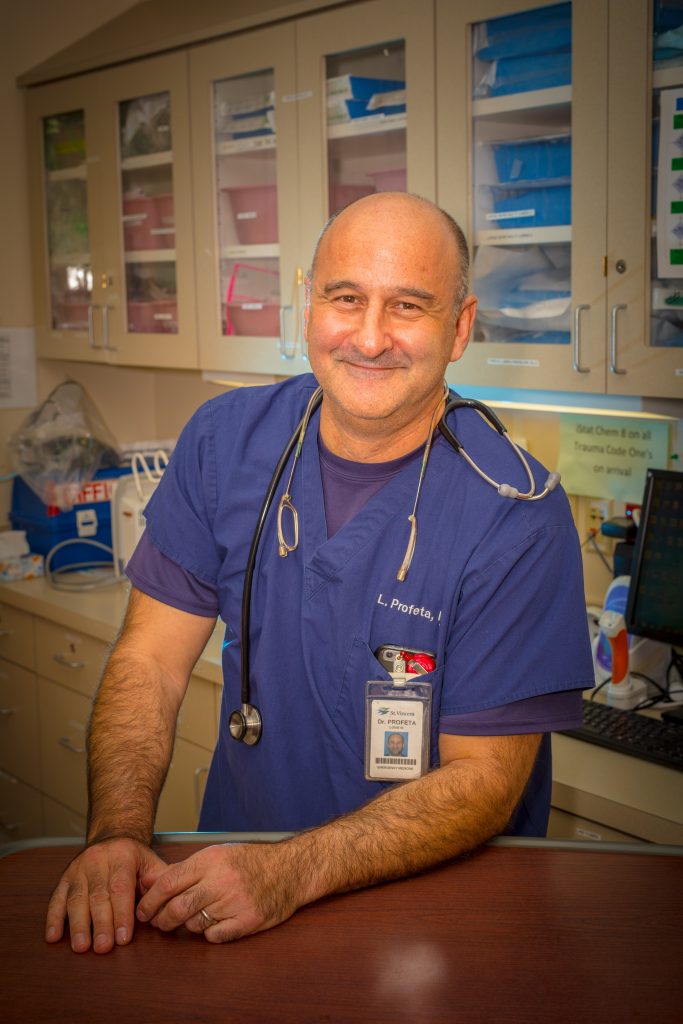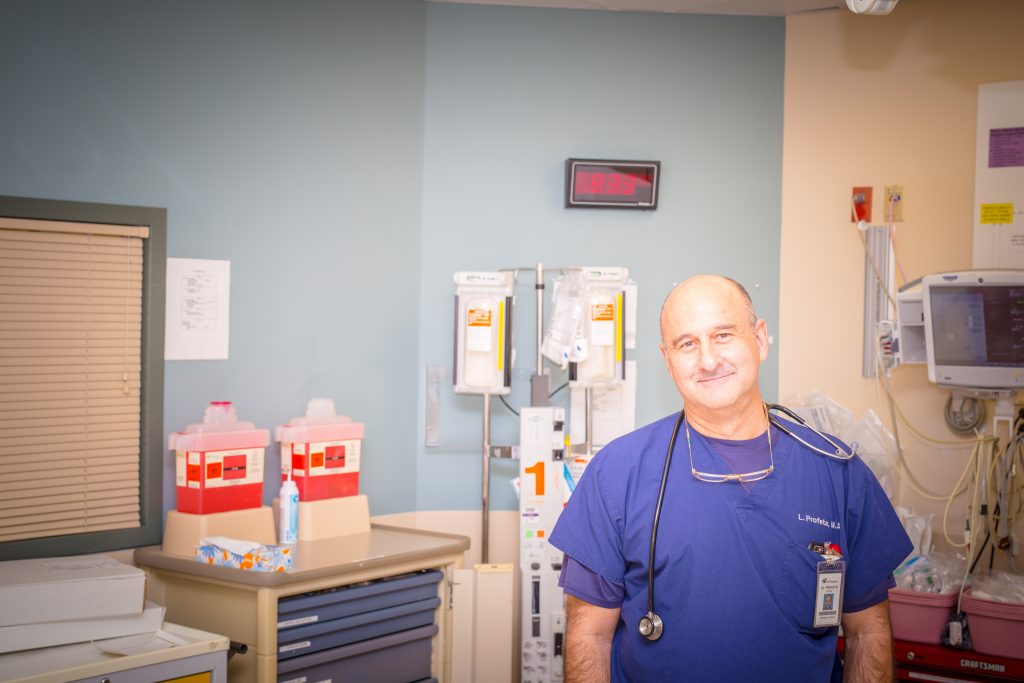Indy Doctor and Author Named LinkedIn’s Top Voice in Healthcare
Writer / Lynda Hedberg Thies
Photographer / Brian Brosmer
 Dr. Louis Profeta has practiced emergency room medicine for 24 years at St. Vincent Hospital. He teaches emergency medicine at Indiana University School of Medicine, is also an expert on mass casualty preparedness and has testified to the U.S. Congress on the topic. He knows a thing or two about the ER environment.
Dr. Louis Profeta has practiced emergency room medicine for 24 years at St. Vincent Hospital. He teaches emergency medicine at Indiana University School of Medicine, is also an expert on mass casualty preparedness and has testified to the U.S. Congress on the topic. He knows a thing or two about the ER environment.
The emergency room offers a window into society’s deepest issues, heroin addiction, end of life choices as well as observations from his experiences. Profeta knows that we have a complicated view of the emergency room, so this married father of three young adult sons, wanted to write about it and share some of the many insights he has gained.
He has become a voice for healthcare, offering a unique window into emergency rooms, and his unique writing style and personal insight is reaching millions.
“We see incredibly uplifting stories and incredibly tragic stories, and it all happens in one day,” Profeta says. “Working in this environment day in and day out, ER doctors will tell you how quickly your life can change and how temporary things are in life.”
Profeta knows this firsthand. His own life was forever changed when he was a senior in high school. An elite gymnast, poised to go
to the Olympics, when one day at practice he landed on his neck and found himself in the ER partially paralyzed. For 30 straight days he lay in traction staring at the ceiling contemplating his future knowing his Division I college scholarship for gymnastics and Olympic dreams were over.
Later on during his medical residency, he rescued a young girl who had touched a pipe-bomb tainted tube of toothpaste that took her left eye and part of her arm. His life changed even more when his oldest son was diagnosed with Leukemia. Profeta took a leave of absence to be at his son’s bedside in New York, where his son was attending college.
There are thousands of stories like this that Profeta has poured into his writing. He is passionate about making a difference, and he is not afraid to confront important issues.
The words came easily for Profeta when he wrote, “The Patient In Room Nine Says He’s God” — a collection of essays, which was published in 2010 to critical acclaim. The book offers a touching side to the ER drama that happens each day and a big window into the heart of Dr. Profeta.
One of those essays in the book, “Your Kid and My Kid Are Not Playing in the Pros”, was republished in NUVO Magazine in March 2014 and took on parents who push their children to excel at sports. Some reactions were positive and some were not, but dialogue was taking place about what Profeta had shared.
The article caught the attention of Chip Cutter, Executive Editor of LinkedIn. Cutter contacted Profeta to ask him if he would be willing to write an article about Ebola. Profeta told him he was not interested because he was sitting at Sloan Kettering Hospital in New York with his son, who was critically ill with Leukemia. Cutter told him that LinkedIn was based out of New York and asked Profeta what, if anything, he could do to help him. Profeta’s response, “Donate blood.” Cutter gathered a few LinkedIn staff and came to the hospital that day to donate. It was enough to convince Profeta to write the article.
“What Scares Me More than Ebola” was published in October of 2014 and has had more than 1.5 million readers. Profeta chastised society’s obsession with using their cell phones to record tragic or dramatic videos instead of calling 911 or helping in some way. The article went on to become one of the most read articles in the history of LinkedIn.
For the second year in a row, Profeta was recognized as LinkedIn’s Top Voice in 2016 for “The 10 Must-Know Writers in Healthcare.” There are three million writers that produce more than 160,000 articles written for the 450 million members of LinkedIn each week, but Profeta’s unique perspective garnered him top honors.
Profeta, with his wry sense of humor says, “You find it odd, but you’ve got this little old ER doc in the middle of nowhere in a suburban hospital in Indianapolis that just happens to have written some of the most read articles in history on palliative care, heroin and physician burnout. It just goes to show you the power of social media. When I talk about an article I wrote, people will often say with a puzzled look on their face, ‘You wrote that?’ and share that they didn’t know he was the writer. That just goes to show you that the message is more important than the author.”
According to LinkedIn, “To determine the ‘top voice’ in a topic, LinkedIn looks at diverse factors, from reader engagement to follower growth.” LinkedIn notes that the top authors in this area “highlighted a healthcare industry at a crossroads, one that is under pressure from shrinking reimbursement, an aging population that is also savvier and more informed than ever before and the uncertain future of the Affordable Care Act.”
Profeta doesn’t write to hear his own words, he writes to speak up for people. On a daily basis, every emergency room physician or nurse is reminded that life is fleeting. Profeta offers this advice.
“Tell your family you love them, and don’t go to bed mad,” he says.
Profeta says the attention is nice but is very clear that what he really wants his legacy to be about is his children. “Because outside of that nothing else matters more to me,” he says.
To buy a copy of “The Patient in Room Nine Says He’s God” order at Amazon.com.








Comments 1